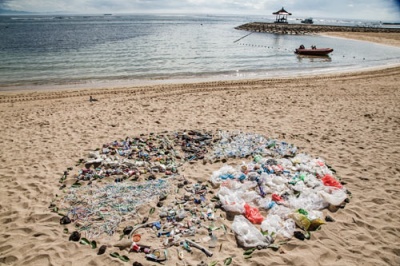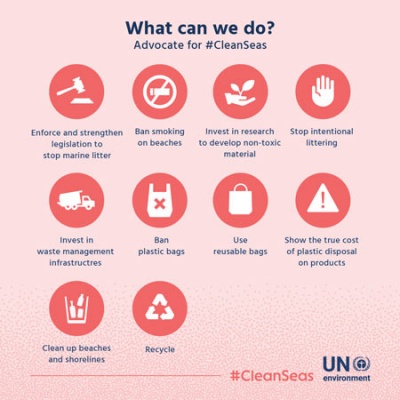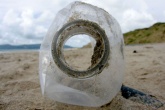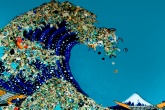UN declares war on marine plastic pollution
The United Nations has launched a global campaign to eliminate the major sources of marine litter by 2022, calling on governments, industry and consumers to take action.

According to the UN, more than eight million tonnes of plastics ends up in the ocean each year, though Eunomia Research & Consulting has estimated that the figure could be as high as 12 million tonnes – the equivalent of over 960,000 London buses.
According to the UN, the amount of plastic produced today is around 20 times greater than that used in the 1960s, and around one-third of all plastic is used for packaging, much of which is then thrown away or littered.
By 2050, plastic production will have to grow another three or four times to satisfy demand, leading the Ellen MacArthur Foundation to estimate that by that year, there will be more plastic than fish in the world’s oceans (by weight). This is especially concerning as the plastic already bobbing in our seas is causing extreme damage to wildlife, tourism and possibly even our own health.
Launching the #CleanSeas campaign, Erik Solheim, Head of UN Environment, said: “It is past time that we tackle the plastic problem that blights our oceans. Plastic pollution is surfing onto Indonesian beaches, settling onto the ocean floor at the North Pole, and rising through the food chain onto our dinner tables. We’ve stood by too long as the problem has gotten worse. It must stop.”
Governments pledging change
Through the campaign, national governments across the world will be urged to pass plastic reduction policies, with 10 countries already signed up to the campaign with ‘far-reaching’ pledges to fight against the amount of plastic polluting waterways and oceans.
Indonesia, which has one of the world’s longest coastlines at 95,000 kilometres, has committed to reducing its marine litter by 70 per cent by 2025, while Costa Rica has agreed to take measures to dramatically reduce single-use plastic through improvements to waste management and public education. Belgium, France and Norway are among the other countries to sign up to the campaign.
Throughout the year, the #CleanSeas campaign will announce measures by countries and businesses to eliminate microplastics from personal care products (with a UK ban due to be agreed at some point this year), ban or tax single-use bags, and dramatically reduce other disposable plastic items.

Industry and consumers also targeted
As well as governments, the campaign will target industry to minimise the amount of plastic packaging and the design of products. Consumers will also be asked to change their behaviour.
Technology giant Dell has pledged its support to the campaign and announced at the summit that it would be carrying out a pilot programme of creating packaging for its products from 25 per cent recycled ocean plastic, saying it will work with partners to intercept plastics in waterways, shorelines and beaches in Haiti before they reach the ocean.
The recovered plastic will be refined, mixed with other recycled plastic and then moulded into new packaging trays for Dell computers. Beginning in May 2017, the pilot will prevent seven tonnes of plastic from entering the ocean, according to the company.
“DELL is committed to putting technology and expertise to work for a plastic-free ocean", said Dell’s Vice President for Global Operations Piyush Bhargava. “Our new supply chain brings us one step closer to UN Environment’s vision of Clean Seas by proving that recycled ocean plastic can be commercially reused.”
Small daily decisions having a ‘dramatic effect’ on our oceans
The campaign also has the backing of a number of celebrities, including folk singer-songwriter Jack Johnson and Entourage actor Adrian Grenier, who is also the founder of Lonely Whale Foundation.

“Today, I take this public pledge to do my part to refuse single-use plastics, starting with the plastic straw. If we start with one small change and hold each [other] accountable, I believe that together we can inspire global action for the health of our oceans.”
UN Environment Goodwill Ambassador Johnson is promoting a new documentary, The Smog of the Sea, which highlights the issue of microplastics permeating the world’s oceans. He said: “I believe there are better alternatives to single-use disposable plastics, and that we as consumers can encourage innovation and ask businesses to take responsibility for the environmental impact of the products they produce.”
European Commission plan for plastics criticised by NGOs
Improved management and design of plastic products is one of the environmental priorities of the European Commission, which last month published a road map ahead of a strategy to create a more circular plastics industry.
The roadmap stated that the strategy would focus on:
- decoupling plastics production from virgin fossil feedstock and reducing its lifecycle greenhouse gas impacts;
- improving the economics, quality and uptake of plastic recycling and reuse; and
- reducing plastic leakage into the environment, in particular the marine environment.
But a partnership of 90 non-governmental organisations, Break Free From Plastic, criticised the roadmap, saying that it failed to get to the root of the problem and needs to ‘focus on reducing and optimising the use of plastics’.
A statement released by the coalition stated: ‘While the commission highlights the many problems of plastic pollution for the marine environment, the coalition regrets that it does not propose adequate measures to tackle the issue. What’s more, for packaging and its role in littering, the commission points at the lack of consumer awareness, rather than addressing the producer’s responsibility and the full range of confusion introduced by biodegradable plastics.’
More information about the UN's #CleanSeas campaign can be found on its website, where you can also pledge to undertake an action to reduce plastic marine pollution.








